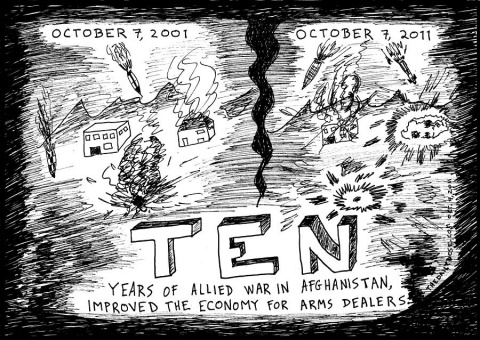Difference between revisions of "2001 Invasion of Afghanistan"
(Opium production in Afghanistan graphic) |
|||
| Line 19: | Line 19: | ||
==Alternative Motives== | ==Alternative Motives== | ||
| + | [[Opium production in Afghanistan.gif|right|400px]] | ||
[[Charlotte Dennett]] suggests that the [[Trans-Afghanistan Pipeline]], planned since the early 1990s provides a more credible alternative explanation.<ref name="ug684">http://unwelcomeguests.net/684</ref> The secret intelligence services have long been interested in the large profits to be made from the global drug trade, for which Afghan grown opium is a major factor. | [[Charlotte Dennett]] suggests that the [[Trans-Afghanistan Pipeline]], planned since the early 1990s provides a more credible alternative explanation.<ref name="ug684">http://unwelcomeguests.net/684</ref> The secret intelligence services have long been interested in the large profits to be made from the global drug trade, for which Afghan grown opium is a major factor. | ||
| − | [[Sibel Edmonds]] links the war to [[Operation Gladio/B]], suggesting that - drug eradication rhetoric not withstanding - one motive for the war was control of the world's opium production. | + | [[Sibel Edmonds]] links the war to [[Operation Gladio/B]], suggesting that - drug eradication rhetoric not withstanding - one motive for the war was control of the world's [[opium]] production. This was very low in 2000 after the crop was banned by the [[taliban]], but has quickly risen again and exceeeded pre-invasion levels. |
==See Also== | ==See Also== | ||
Revision as of 06:12, 8 May 2015
| Date | 7 October 2001 - Present |
|---|---|
| Description | The ongoing war in Afghanistan, instigated within a month of 9/11, supposedly in retaliation, with the claimed justification - for which no evidence has been presented - that the attacks were planned by Ossama bin Laden, and that he was based in Afghanistan. |
This is an ongoing conflict, led by the US and involving military contingents from many other countries. It began on October 7, 2001, as the US military's Operation Enduring Freedom (OEF) with substantial British military support, allegedly (as the official narrative has it) 'in response to the September 11th, 2001 attacks on the US'. The UK has, since 2002, led its own military operation, Operation Herrick, as part of the same war in Afghanistan. By 2015, it has cost the US government over $1,000,000,000,000.[1]
Contents
Official Narrative
The justification for the attacks we as that the 9/11 attacks of September 11, 2001 were carried out by Al-Qaeda under the leadership of Ossama Bin Laden, who was taking refuge in Afghanistan, under the protection of Taliban forces.
Problems
Osama Bin Laden denied responsibility for the attacks and no evidence has been presented of his responsibility. On 5 October, the Taliban offered to try bin Laden in an Afghan court, so long as the U.S. provided what it called "solid evidence" of his guilt. The U.S. government dismissed the request for proof as "request for delay or prevarication".
Supreme International Warcrime?
...
Alternative Motives
right|400px Charlotte Dennett suggests that the Trans-Afghanistan Pipeline, planned since the early 1990s provides a more credible alternative explanation.[2] The secret intelligence services have long been interested in the large profits to be made from the global drug trade, for which Afghan grown opium is a major factor.
Sibel Edmonds links the war to Operation Gladio/B, suggesting that - drug eradication rhetoric not withstanding - one motive for the war was control of the world's opium production. This was very low in 2000 after the crop was banned by the taliban, but has quickly risen again and exceeeded pre-invasion levels.
